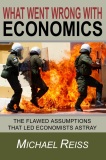Last night I saw a presentation by Martin Wolf of the FT outlining the UK government's plans for reducing the deficit. At one point he produced some graphs showing the projections upon which the plans are based. They are based on an assumption that the rate of growth of GDP and the rate of growth of tax revenue will increase at the same rate as before the crash. I instantly realised that the projections were almost impossible to occur.
The problem revolves around the money supply. Currently the money supply is being held up by the issuance of government bonds which increases government debt. If the government reduces its borrowings, which is of course the plan, then the money supply will fall unless someone else starts borrowing on a massive scale. The question now is: Who's going to do all this borrowing? Surely it can't be borrowing for mortgages - unless the government is hoping that house prices as a multiple of earnings is going to head towards Japanese levels circa 1990. Another problem not mentioned is the paradox of thrift. When the news is filled with stories of government job losses, people respond by tightening their belts. Who wants to take out new loans when you are worried about job security?
Unless the government can find another bubble to blow up (and let us pray that they can't) then their plan for reduction of government debt is guaranteed to fail.
Now one mights say - who cares about the money supply - we can still pay our taxes even if the money supply remains constant. Well the problem is that part of the projections Martin showed was a graph predicting a steadily growing nominal tax income. But if the nominal tax income rises whilst the money supply is falling then the fraction of our income paid in tax is going to be growing at a quite alarming rate. There will necessarily be a significant shrinkage in the money available for spending in the private sector. How is our GDP expected to grow at a healthy rate while the amount of money available for consumption is shrinking fast?
It just doesn't add up.
Of course if the government just printed the money debt-free instead of via the mechanism of selling government bonds, then the government may stand a better chance.
Martin Wolf is supposed to be a great economist - have I made some mistake? Comments please...
Saturday, 5 February 2011
Subscribe to:
Post Comments (Atom)




“Currently the money supply is being held up by the issuance of government bonds which increases government debt. If the government reduces its borrowings, which is of course the plan, then the money supply will fall unless someone else starts borrowing on a massive scale.”
ReplyDeleteYou’ve assumed, I think, that government borrowing is required in order to create money (monetary base to be more exact). False assumption.
While it just so happens that the “money supply” (monetary base to be more exact) is normally expanded via government borrowing under the bizarre system we currently have in place, this is not necessarily the case. That is it is perfectly possible to expand the monetary base without any government borrowing. I.e. a central bank can simply credit any institution it likes with any amount of money it like any time it likes. Alistair Darling made £60bn available to RBS and HBOS at the stroke of a pen at the height of the credit crunch.
Indeed Keynes and Abba Lerner advocated this method of monetary base expansion.
In the second part of the same para you deal with money created by the commercial bank system. That is very different stuff from monetary base. I don’t accept that this form of money (unlike monetary base) CAUSES anything. It is the RESULT of increased economic activity. E.g. when someone gets a £50,000 mortgage from a bank, the bank creates £50,000 out of thin air AS A RESULT OF HAVING COME BY A CREDIT WORTHY CUSTOMER AND LENT TO THEM.
You’ll find a discussion on this result/cause argument in a Standpoint article between Congdon and Skidelsky. Congodon is wrong and Skidelsky is right in my view. See:
http://www.standpointmag.co.uk/dialogue-december-09-tim-congdon-robert-skidelsky-john-maynard-keynes-recession
Also Bill Mitchell is good on the distinctions between monetary base and commercial bank created money. See: http://bilbo.economicoutlook.net/blog/?p=381
But BM turns out a long article every day. If you don’t like the latter one, look around for another.
I just had a look at your profile and blog - I was just reading "seven deadly innocent frauds of economic policy" today! I have some issues with it. Particularly with regard unemployment - I am pretty sure the chartalist explanation is wrong. If you're interested in discussing this further please drop me an email - reissgo@gmail.com
ReplyDeleteWhat evidence is there that the money supply is constant? What evidence is there that the money supply has ever been constant? (Surprisingly little as it happens, even under the gold standard era, for any long run monetary time series) Defining money here as physical notes and coin +bank deposits - the monetary base is not useful as a money supply definition for Basel regulated systems.
ReplyDeleteThere are at least two money generating exploits in Basel regulated systems that are outside central bank control - quite possibly more. The UK money supply even without deliberate QE seems to expand between 2-5% a year, and since GDP is proportional in part to the money supply, then it should continue to expand. But purely for quantitative reasons, not for any nuts and bolts economic ones.